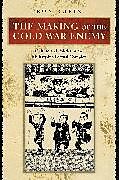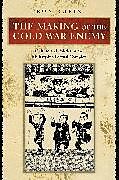The Making of the Cold War Enemy
Einband:
Kartonierter Einband
EAN:
9780691114552
Untertitel:
Culture and Politics in the Military-Intellectual Complex
Genre:
Geschichte
Autor:
Ron Theodore Robin
Herausgeber:
Princeton University Press
Anzahl Seiten:
294
Erscheinungsdatum:
26.01.2003
ISBN:
0691114552
"The Making of the Cold War Enemy presents an important perspective with far-reaching moral, political and intellectual implications regarding the post-WWII behavioral science project. . . . Robin's book thus deserves our careful consideration."---Mark Solovey, Journal of the History of the Behavioral Sciences
Autorentext
Ron Robin is Professor of History and Dean of Students at Haifa University in Israel. He is the author of Enclaves of America: The Rhetoric of American Political Architecture Abroad and The Barbed Wire College: Reeducating German POWs in the United States during World War II (both Princeton).
Klappentext
At the height of the Cold War, the U.S. government enlisted the aid of a select group of psychologists, sociologists, and political scientists to blueprint enemy behavior. Not only did these academics bring sophisticated concepts to what became a project of demonizing communist societies, but they influenced decision-making in the map rooms, prison camps, and battlefields of the Korean War and in Vietnam. With verve and insight, Ron Robin tells the intriguing story of the rise of behavioral scientists in government and how their potentially dangerous, "American" assumptions about human behavior would shape U.S. views of domestic disturbances and insurgencies in Third World countries for decades to come. Based at government-funded think tanks, the experts devised provocative solutions for key Cold War dilemmas, including psychological warfare projects, negotiation strategies during the Korean armistice, and morale studies in the Vietnam era. Robin examines factors that shaped the scientists' thinking and explores their psycho-cultural and rational choice explanations for enemy behavior. He reveals how the academics' intolerance for complexity ultimately reduced the nation's adversaries to borderline psychotics, ignored revolutionary social shifts in post-World War II Asia, and promoted the notion of a maniacal threat facing the United States. Putting the issue of scientific validity aside, Robin presents the first extensive analysis of the intellectual underpinnings of Cold War behavioral sciences in a book that will be indispensable reading for anyone interested in the era and its legacy.
Inhalt
List of Illustrations ix List of Abbreviations xi Acknowledgments xv Introduction: Rumors of an Enemy 3 PART ONE: DEFINING THE PARADIGM 1.Inventing the Behavioral Sciences 19 2.The Culture of Think Tanks 38 3.Psychopolitics and Primary Groups: Theories of Culture and Society in Cold War Academia 57 PART TWO: NORMAL SCIENCE 4.The Obstinate Audience: The Art of Information Management in the Cold War 75 5.The War of Ideas:Ideologyand Science in Psychological Warfare 94 6.Deus ex Clinica : Psychopolitics and Elite Studies of Communism 124 7.Collective Behavior in Totalitarian Societies: The Analysis of Enemy POWs in Korea 144 8.Prison Camps and Culture Wars: The Korean Brainwashing Controversy 162 PART THREE: CRISIS 9.Vietnam: From "Hearts and Minds" to "Rational Choice" 185 10.Paradigm Lost: The Project Camelot Affair 206 11.Epilogue:Report from Iron Mountain and Beyond 226 Notes 239 Index 271

Leider konnten wir für diesen Artikel keine Preise ermitteln ...
billigbuch.ch sucht jetzt für Sie die besten Angebote ...
Die aktuellen Verkaufspreise von 5 Onlineshops werden in Realtime abgefragt.
Sie können das gewünschte Produkt anschliessend direkt beim Anbieter Ihrer Wahl bestellen.
Loading...
Die aktuellen Verkaufspreise von 5 Onlineshops werden in Realtime abgefragt.
Sie können das gewünschte Produkt anschliessend direkt beim Anbieter Ihrer Wahl bestellen.
| # | Onlineshop | Preis CHF | Versand CHF | Total CHF | ||
|---|---|---|---|---|---|---|
| 1 | Seller | 0.00 | 0.00 | 0.00 |
